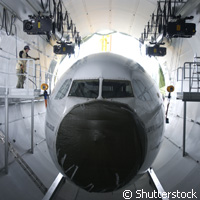Europeans tackle improved aircraft systems efficiency
Europeans are rising to the challenge to make air transport not only cost-effective, but sustainable and good to the environment as well. Helping in this effort is the Fraunhofer Institute for Building Physics (IBP) in Germany, which is expanding its flight test facility in Holzkirchen in order to achieve efficient energy management onboard. Complementing this research venture is the CSSA ('Clean sky support action') joint technology initiative (JTI) that targets strengthening the technological capability of Europe to manufacture aircraft that not only satisfy environmental needs but are economically viable. Backed with EUR 2 million under the Transport Theme of the EU's Seventh Framework Programme (FP7), CSSA is developing an electrical test bench to obtain a comprehensive picture of the energy balance in aircraft. Led by the French group Airbus SAS, CSSA brings together experts from Germany, Spain, France, Italy, Sweden and the United Kingdom. The IBP researchers say rapid changes in temperature play havoc on aircraft technical systems and materials. For instance, an aircraft departs from Munich, Germany, which has sunny and balmy temperatures, and lands in the US state of Alaska, where a blizzard is hitting the city of Anchorage, and temperatures are a cold -15° Celsius. When the aircraft takes off the next morning, after dealing with frigid -25° temperatures overnight, it heads for sunny and arid Dubai, with temperatures of 32° The temperature on the outside of the fuselage is over 80°. So what must happen to ensure the correct and timely function of all onboard equipment? Working at their flight test facility, the Fraunhofer IBP researchers say an extra piece of equipment, the thermal test bench, will help produce new systems like air condition and lighting and power supply. The team will present the project at the Paris Air Show in Le Bourget from 20 to 26 June 2011. 'The thermal test bench comprises a number of different elements, but the main one is the aircraft calorimeter, which is integrated into the low-pressure chamber of our flight test facility,' explains project manager Dr Gunnar Grün of Fraunhofer IBP. 'We can simulate environmental conditions inside the aircraft, as well as external conditions on the ground or in flight, and see how the equipment copes.' The team believes it can shed major light on the effect of ambient temperature on the thermal behaviour of aircraft systems. According to the scientists, they will assess the interplay between components, materials and ambient temperature. They will use metal and fibre-composite fuselage sections to evaluate the interplay of new electric systems and aircraft parts in different conditions. 'For reasons of space, large electrical components are accommodated in the rear, while other systems are located in the cockpit,' Dr Grün says. 'With the thermal test bench we will be able to show how the waste heat from the lights, the power electronics or the inflight entertainment impacts on the environment in the aircraft interior - and vice versa.' The team could then determine how to arrange the systems and how to efficiently remove or reuse waste heat. 'Imagine you want to use a laptop in the sauna. It has to release heat in order to function. At the high temperatures the built-in fan no longer does the job and so you have to find a different solution, for example heat conduction.'For more information, please visit:Fraunhofer Institute for Building Physics (IBP):http://www2.ibp.fraunhofer.de/index_e.htmlCSSA:http://www.cleansky.eu/Research in FP7 Transport:http://cordis.europa.eu/fp7/transport/
Countries
Germany, Spain, France, Italy, Sweden, United Kingdom



